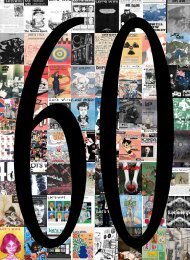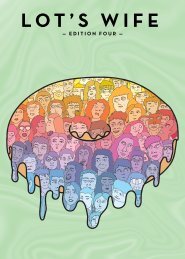Lot's Wife Edition 8 2013
You also want an ePaper? Increase the reach of your titles
YUMPU automatically turns print PDFs into web optimized ePapers that Google loves.
SUBHEADING<br />
NOW YOU SEE ME<br />
Levi Truong<br />
Do you believe in Magic?<br />
Well, no, of course not, silly fool. The point is not to believe in<br />
the magic, but to be entranced by the trickery behind the illusion. To<br />
deconstruct the process and make visible the deception would benefit no<br />
one past the initial amusement, thus making miserable geezers of us all.<br />
Now You See Me is the latest comeback (or, if you’d like,<br />
redemption) for director Louis Leterrier of Transporter fame and Clash<br />
of the Titans shame. The scene opens with four self-assured, practiced<br />
magicians/tricksters: J. Atlas (Jesse Eisenberg), the illusionist; Merritt<br />
McKinley (Woody Harrelson), a mentalist; Henley Reeves (Isla Fisher),<br />
an escapist and Jack Wilder (James Franco the younger, Dave) as a<br />
sleight-of-hand pickpocket – all being recruited by a brooding, enigmatic<br />
hooded figure to be part of some kind of Teenage Mutant Ninja Turtles<br />
gang. The assemblage is inexplicably titled ‘The Four Horsemen’ (so I<br />
guess they’re more like Adult Magical Ninja Horses).<br />
Things get interesting for the AMNH as - now famous and funded<br />
by insurance mega-millionaire Arthur Tressler (Michael Caine) - they<br />
seemingly rob a bank in Paris and distribute the spoils to their supposedly<br />
underprivileged Las Vegas audience (via bombastic cash storm). Needless<br />
to say, this is all rather suspicious, and before anyone can say ‘alacazam’<br />
the Horsemen are arrested and interrogated by FBI agent Dylan Rhodes<br />
(Mark Ruffalo) and his new partner Alma Dray (Beginners beauty<br />
Melanie Laurent). Predictably, they reveal nothing, because one must<br />
not dishonour the Magician’s Code, so Rhodes enlists the help of a<br />
magic debunker with a mystical yet pretentious name, Thaddeus Bradley<br />
(Morgan Freeman). Spills and thrills and clashes occur, and what was<br />
originally an innocent show becomes more thrilling when it appears their<br />
tricks are no longer working to their advantage<br />
Throughout the film, characters warn us with a heavy heart to avoid<br />
“com[ing] in closer, because the closer you think you are, the less you’ll<br />
actually see.” In order for the film to establish some kind of believability,<br />
the director must navigate between what to portray, and what to leave<br />
to the imagination. Two fundamental questions need to be asked: Can<br />
it balance realism without losing the – for lack of a better word – magic<br />
of film? To spend the entire film explaining how each trick was executed<br />
would be a bore (and perhaps not even a movie), but to then leave<br />
everything unexplained and for the audience to fill in the gaps is lazy<br />
and unrewarding. There is only so much one can expect from suspension<br />
of disbelief; in return for turning your brain off the film must deliver<br />
something worthwhile.<br />
So, does the film achieve this tricky equilibrium?<br />
A quick glance through recent reviews suggests the negatory, with<br />
many finding the logical leap within the mechanics of the heist too much<br />
to handle. Though this is understandable, it is unfortunate that many<br />
have lost the ability to appreciate (or consider themselves too superior<br />
for) popcorn flicks; isn’t magic itself inconsequential and, at the end of<br />
the day, insignificant?<br />
No, I’m not advocating the perpetuation of the mindless, moneychurning<br />
monster that is the current Hollywood movie-making culture.<br />
And yes, just because you want to turn your mind off and escape doesn’t<br />
mean you can. However, this is different to the critics purposeful hyperscrutiny.<br />
It ruins the enjoyment of the film (which is rich coming from<br />
an aspiring film critic) when one refuses to forgive the minor flaws. It’s<br />
okay to hate these films when you really can’t overlook all the gimmicks<br />
(which is why the seasoned critics, already overexposed to many films like<br />
this a year, cannot tolerate so well). But this film, I feel, has more to offer<br />
in return than people realise. You’ll just have to let yourself appreciate the<br />
magic.<br />
Part of the reason it was harder to notice the film’s misgivings and<br />
cheesiness was the acting. The ubiquitous beauty of Freeman’s melodicmoney-making<br />
voice does not require reiteration, and Michael Caine is<br />
Michael Caine. Your arguments are invalid, and so are his adversaries’.<br />
Each word he says, no matter how clichéd or expository in nature, is<br />
a universal truth. You, the audience, are the one who is clichéd and<br />
expository.<br />
And that’s my point entirely. You can definitely notice the longwinded<br />
exposition necessary for the audience’s understanding. And yes<br />
you can criticise its lack of subtlety (though be kind, magic tricks are hard<br />
to explain!). But Freeman’s delivery was so natural and perfectly adapted<br />
to the character that in the end, it doesn’t even matter. You should only<br />
notice the flaws because of poor movie-making, not because you are<br />
anhedonic and hypercritical.<br />
Do you need to believe in magic to like this film? No. But you do<br />
need to give it a break. Go see it, now.<br />
But not too closely.<br />
LOT’S WIFE EDITION 8 • <strong>2013</strong><br />
45


















